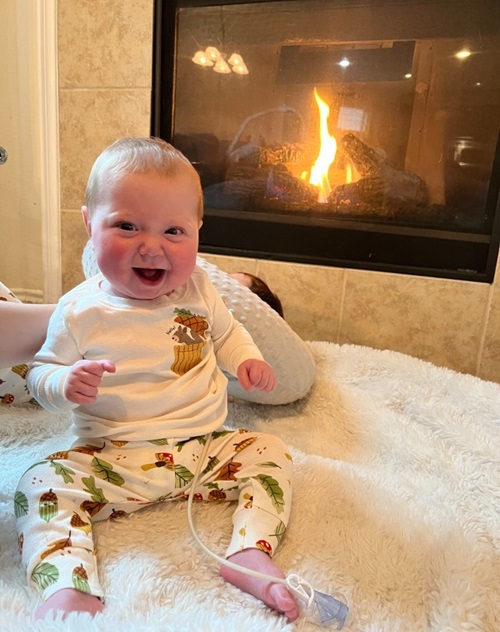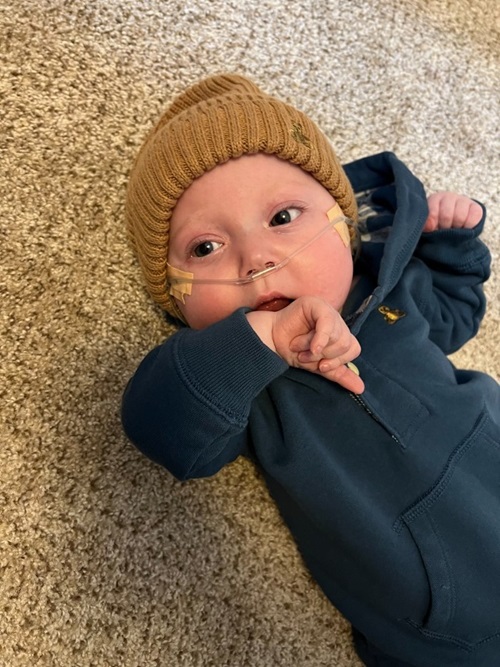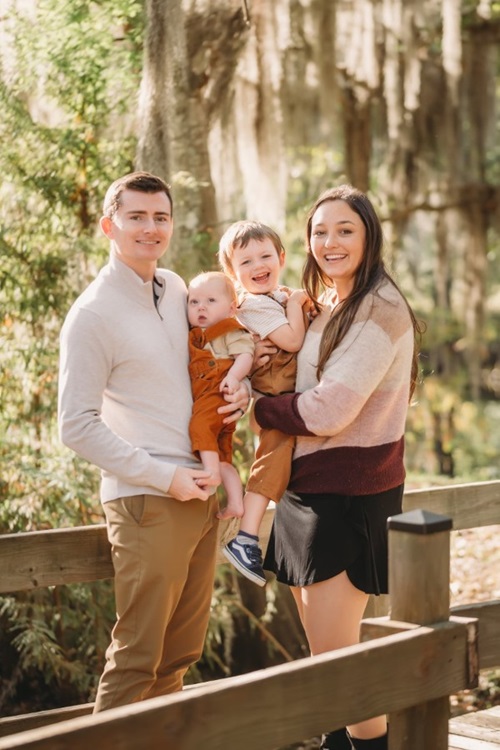Theodore Toomey is a happy, growing and thriving baby. At just 12 months old, his courage and inner strength have inspired others beyond his age to never give up no matter how hard it gets.
When Theodore was 3 days old, he had his first open-heart surgery. More heart surgeries and setbacks would follow, but Theodore kept fighting. To his parents, he’s a fierce heart warrior.
Lauren and James Toomey discovered something was wrong with their son’s heart during a 20-week anatomy scan at their OB/GYN’s office near their home in San Diego, California.

The Toomeys were scared, in shock and in disbelief. They wanted a second opinion to see if their baby really had a heart condition. After processing the news as best they could, Lauren called various hospitals in San Diego to schedule a visit with a fetal cardiologist. When she finally got an appointment, the doctor ran an echocardiogram and confirmed what her OB/GYN had told her.
“Our baby’s heart was in bad shape,” said Lauren. “Theodore did not have a left ventricle at all, and the fetal cardiologist told us there was really no hope for our baby. He gave us termination options – and my husband and I were not going to do that. The doctor said he probably wouldn’t survive to term, and if he did, it would be a hard life for him. He would require multiple surgeries. We left there discouraged, but not hopeless. James and I were determined to fight for our baby.”
A Complex Heart
Theodore was diagnosed with hypoplastic left heart syndrome (HLHS), a complex congenital heart defect in which the left side of the heart is underdeveloped and cannot pump oxygen-rich blood to the body. Babies with this condition need a minimum of three open-heart surgeries. In addition to not having a left ventricle, Theodore had severe tricuspid valve regurgitation where the tricuspid valve does not close properly, allowing blood to leak backwards in the heart. The combination of these two heart problems made Theodore’s case unique and complex, and, because of this, many pediatric heart centers that the family reached out to were not willing to pursue his case. Besides structural heart defects, Theodore had other complications including heart arrhythmias and blocks.
Pushing Our Son’s Case
The Toomeys were determined to find a hospital and medical team that would accept their son’s case, no matter how far they’d have to travel from their San Diego home.
To start, Lauren scheduled another appointment – this time with a heart surgeon close to home. But the surgeon offered them only one treatment option: a heart transplant.
“We searched elsewhere,” said Lauren. “We looked at other heart programs in the U.S. and reached out to surgeons to see if we had more options for our baby.”
The Toomeys came across another pediatric hospital in Houston, Texas, that performed surgeries for heart conditions. Lauren called the hospital for a consultation, and the family made plans to move to Houston.
On October 31, 2021, Lauren, James and their 2-year-old son, Logan, moved to Houston.
“Within the first week of being in Houston and meeting with the other heart center, I went in for an ECHO and the cardiologist told us Theo’s case did not look good,” said Lauren. “He was not sure what their team could offer us, but that he would present Theo’s case at their surgical conference and get back to us. We urged him to advocate for our son’s case to the best of his ability. I told him I knew Theo was strong. He was kicking and acting so normal, and I knew he was meant to be here. When the cardiologist returned from the surgical conference, he told us it was a unanimous decision among the entire surgical conference team not to offer Theo any interventions, aside from palliative care, which is hospice for babies. They would not offer surgery, heart transplant, or attempt any surgical intervention at all. They told us in their opinion, Theo was too sick for treatment and likely wouldn’t make it to term.”
The Toomeys never stopped advocating for their son.
“We appealed our son’s case to the top children’s hospitals across the nation,” said Lauren. “We called everywhere outside of Texas. But another one of the children’s hospitals that we happened to learn about during our research process was also in Houston, and coincidentally very close to our original heart center. We read as much as we could about the Children’s Heart Institute at Children’s Memorial Hermann Hospital and about Dr. Salazar. We learned that he specializes in rare heart defect cases. We thought maybe he could help us out. I reached out, and Children’s Memorial Hermann Hospital was the first hospital out of more than 10 others to answer us immediately. We booked an appointment with Dr. Salazar two days later.”
Jorge Salazar, MD, is professor and chief of pediatric and congenital heart surgery at McGovern Medical School at UTHealth Houston and an affiliated pediatric cardiothoracic surgeon at Children’s Memorial Hermann Hospital. Dr. Salazar serves as executive director of the Children’s Heart Institute at Children’s Memorial Hermann Hospital.
The Children’s Heart Institute at Children’s Memorial Hermann Hospital – named one of the best children’s hospitals nationally in Cardiology and Heart Surgery by U.S. News & World Report – offers innovative solutions for patients with congenital or acquired heart disease, delivering high-quality outcomes. In collaboration with pediatric specialists at McGovern Medical School at UTHealth Houston, the affiliated team provides comprehensive care for newborns, children and adolescents, with a smooth transition into adult congenital cardiac care.
A Glimmer of Hope
By the time Lauren met with Dr. Salazar in November 2021, she was 7 months pregnant. During the consultation, Dr. Salazar reviewed Theodore’s case and felt confident that he could help them.
“It was absolutely mind-blowing to hear him say that,” said Lauren. “It felt too good to be true after hearing so many doctors tell us to terminate my pregnancy because our son’s case was impossible. Dr. Salazar told us he would give it a shot. After Theodore was born, he would perform surgery to treat his HLHS and tricuspid valve regurgitation. Dr. Salazar also told us he couldn’t promise 100% everything would go as planned. However, since he handled cases like this before, he was hopeful.”
Lauren began seeing her maternal-fetal medicine specialist, Jerrie Refuerzo, MD, at The Fetal Center at Children’s Memorial Hermann Hospital for the remainder of her pregnancy. Lauren was high risk due to hyperemesis gravidarum, a rare condition characterized by severe and persistent nausea and vomiting, weight loss, electrolyte abnormalities, and need for hospitalization. Dr. Refuerzo, a professor in the Division of Fetal Intervention in the Department of Obstetrics, Gynecology and Reproductive Sciences at UTHealth Houston , is the director of the Maternal Care Program at The Fetal Center and affiliated with Children’s Memorial Hermann Hospital.
“We monitored Lauren’s pregnancy closely,” said Dr. Refuerzo. “At The Fetal Center, we provided collaborative care for her and her baby with fetal echocardiograms and ultrasounds for growth and fetal well-being. Within the Maternal Program at The Fetal Center, we provided comprehensive prenatal care including close maternal monitoring assessing for appropriate maternal weight gain, preterm labor, and hypertension of pregnancy. We scheduled the timing of Lauren’s delivery in coordination with the pediatric specialists in the NICU, Pediatric Cardiology and Pediatric Cardiovascular Surgery. Most importantly, we gave positive encouragement to help her and her family through her high-risk pregnancy.”
On January 5, 2022, Lauren and James welcomed their newborn son, Theodore, who was born at Children’s Memorial Hermann Hospital. He was delivered at 37 weeks’ gestation and weighed six pounds. The couple got to hold their son briefly before he was sent to the neonatal intensive care unit (NICU).
The NICU at Children’s Memorial Hermann Hospital has 118 beds and is classified as a Level IV NICU by the Texas Department of State Health Services (DSHS)—the highest level of care available for premature and critically ill newborns.
Avichal Aggarwal, MD, an associate professor of pediatric cardiology at UTHealth Houston and affiliated with Children’s Memorial Hermann Hospital, oversaw Theodore’s care after birth and checked on him frequently during his hospitalization. Dr. Aggarwal manages babies with high-risk heart defects and those in need of a heart transplant. He reassured Theodore’s parents that in case the planned surgeries did not result in the desired outcome, they had a backup plan for a heart transplant if the need arose.
Mohammed Numan, MD, also part of Theodore’s cardiology care team, helped manage Theodore’s arrhythmias and other heart-related problems. Dr. Numan is professor of pediatric cardiology at UTHealth Houston, and a cardiologist affiliated with Children’s Memorial Hermann Hospital.
Theodore’s First Heart Surgery

Dr. Salazar and his team’s primary focus was to give Theodore the opportunity to live a full life by doing whatever they could to restore normal function to his heart in the safest manner possible. Despite Theodore’s complex case, the team looked for the potential of what his heart could be.
“We considered all of the treatment options available before determining the best pathway to treat Theodore’s unique heart,” said Dr. Salazar. “When faced with extremely challenging heart cases like Theodore’s, we want to give as many kids as possible the most normal heart achievable. In Theo’s case, his first open-heart surgery was one of several steps we took to help improve his outcomes.”
“The first surgery lasted well over 12 hours,” said Lauren. “After surgery, our son’s chest remained open, he was heavily sedated, and he was on 10 medicine pumps – and that’s when it got really real for us. My husband and I were with Theodore throughout his seven-month hospital stay. We would alternate so that one of us was always with Theodore or Logan.”
An Uphill Road Ahead
Theodore’s first open-heart surgery marked the beginning of more surgeries and procedures.
After the Norwood surgery, Theodore struggled a lot with arrhythmias and low cardiac output. During his struggle, his heart stopped. He had to have CPR twice, and the team was able to resuscitate him. During one of these episodes, Theo was put on ECMO, a heart-lung bypass machine that supports the body when a patient’s organs are too sick or weak to do the job.
The Pediatric ECMO Program at Children’s Memorial Hermann Hospital has been recognized by the Extracorporeal Life Support Organization as a Designated Center of Excellence. Since 1992, the program, one of the oldest in Texas, has used ECMO to treat more than 500 patients. As a high-volume program in Texas, and one of only two centers in Houston offering pediatric ECMO, the program supports about thirty children each year.
After being placed on ECMO, Theodore continued to have tricuspid valve regurgitation. He was transferred to the OR where Dr. Salazar repaired his tricuspid valve and performed a MAZE procedure (a surgery to address irregular heartbeats) to help with his intractable arrhythmias.
“As Theo continued to require more heart surgeries and interventions over the next few months, that is when James and I began to feel more and more discouraged,” said Lauren. “However, our son kept fighting, and I think that was the biggest encouragement of all – to see that Theo wasn’t giving up. That really kept us going, and I drew a lot of my strength from him.”
After going through so many uphill battles for the first four months, Theodore was able to have the Glenn procedure after which he started to thrive. After the procedure, Theodore’s heart rate began to drop too low or peak too high. So, Dr. Salazar implanted a permanent pacemaker. In addition to having a pacemaker, Theodore also takes medication to help manage his intractable arrhythmias.
Theodore spent six months in the Children’s Heart Institute Cardiac Intensive Care Unit (CICU). He fought against everything. He went through so much, but he remained strong.
“We became friends with so many of the nurses,” said Lauren. “We were there every day asking questions. We attended daily rounds. They included us in decisions for our son’s care. There was never a time where we were pushed into anything we didn’t want to do. They were our family.”
On June 20, 2022 – after six months in the hospital – the Toomeys brought their son home. They settled in Houston permanently to be near Theodore’s medical team.
“It was one of the best days of our lives,” said Lauren. “The nurses lined the halls, and everyone was cheering for us as we walked around the unit. We were happy to finally take our baby home.”
Theodore Today
Now 12 months old, the Toomeys says their son is doing better than anyone thought he would. He endured multiple heart procedures in his first six months of life, as well as a few other procedures after he left the hospital, including surgeries for tongue tie and Nissen fundoplication to treat acid reflux.
“When he came home from the hospital, he was on oxygen support and he was taking over 17 different heart medications,” said Lauren. “Now, he is off oxygen support and is tolerating more milk than ever before, which is a huge achievement. We are gradually weaning him off more of his medications. Considering everything he has been through, he is doing well. Theo is a happy baby who loves to laugh. He loves bopping to music and playing in the water. He loves his big brother.”
Theodore sees Dr. Aggarwal every four weeks for echocardiograms and pacemaker evaluations, which is an important part of his follow-up care. Recently during one of Theodore’s regular visits, Dr. Aggarwal noticed Theodore’s heart function was depressed, meaning the blood flow to his heart was slowing down due to the constriction of his aorta. So, Theo underwent a balloon dilation of his aortic arch in the Cardiac Cath Lab immediately. Thanks to the family’s commitment to follow-up care, Theodore’s heart issue was identified and treated promptly.

The Toomeys were hopeful and never once gave up even when they were told their son's case was impossible and hopeless. When several doors closed, their determination to keep on fighting and advocating for their son grew stronger. Theodore is doing amazingly well, more than anyone could have imagined. It started with a hospital believing in their son and taking that giant leap of faith.
“There is always hope,” said Lauren. “For families facing daunting situations, it’s important to find a team you feel comfortable with, advocate continually for your child, and don’t let anyone stop you from fighting for them. Theodore is here and thriving because he had a team who believed in him. We are grateful to Dr. Salazar, Dr. Aggarwal and the entire team at Children’s Memorial Hermann Hospital for giving him a chance.”
Contact Us
To contact Children’s Heart Institute at Children’s Memorial Hermann Hospital, please fill out the form below.
The Children’s Heart Institute is a collaboration between the affiliated physicians at McGovern Medical School at UTHealth Houston and Children’s Memorial Hermann Hospital. Typically, patients are seen on an outpatient basis at a UT Physicians clinic with all inpatient procedures performed at Children’s Memorial Hermann Hospital.
The facts and the physician affiliations discussed in this article were confirmed at the time of the article’s original publication.